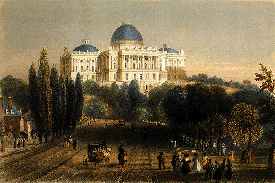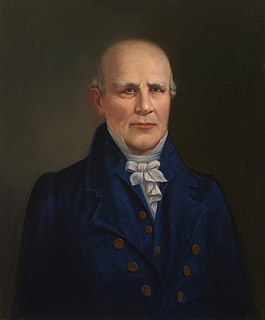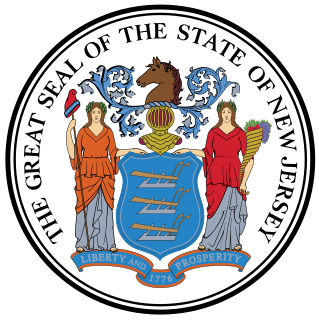On December 15, 1829, a special election was held in Pennsylvania's 16th congressional district to fill a vacancy caused by the resignation of Representative-elect William Wilkins (AM) on November 9, 1829, prior to the start of the 21st Congress.
On December 15, 1829, a special election was held in Pennsylvania's 16th congressional district to fill a vacancy caused by the resignation of Representative-elect William Wilkins (AM) on November 9, 1829, prior to the start of the 21st Congress.
| Candidate | Party | Votes [1] | Percent |
|---|---|---|---|
| Harmar Denny | Anti-Masonic | 4,208 | 57.7% |
| James S. Stevenson | Jacksonian | 3,090 | 42.3% |
Denny took his seat on December 30, 1829. [2]

The Twenty-first United States Congress was a meeting of the legislative branch of the United States federal government, consisting of the United States Senate and the United States House of Representatives. It met in Washington, D.C. from March 4, 1829, to March 4, 1831, during the first two years of Andrew Jackson's presidency. The apportionment of seats in the House of Representatives was based on the Fourth Census of the United States in 1820. Both chambers had a Jacksonian majority.

Hawaii's 1st congressional district is a congressional district in the U.S. state of Hawaii. The district is located entirely on the island of Oahu, encompassing the urban areas of the City and County of Honolulu, a consolidated city-county that includes Oahu's central plains and southern shores, including the towns of Aiea, Mililani, Pearl City, Waipahu and Waimalu. The district is smaller and more densely populated than the 2nd Congressional District.

Elections to the United States House of Representatives were held in 1868 to elect Representatives to the 41st United States Congress. The election coincided with the presidential election of 1868, which was won by Ulysses S. Grant.

In the United States House of Representatives elections of 1830 the supporters of President Andrew Jackson lost ten seats during his first term, but managed to maintain control of the chamber amidst the growth of two new opposition movements.

In the United States House of Representatives elections in 1828 and 1829, the Jacksonians soundly took control of the presidency, with Andrew Jackson's victory, and greatly increased their majority in Congress. Outgoing President John Quincy Adams's unpopularity played a major role in the Jacksonian pick-up, as did the perception of the Anti-Jacksonian Party as urban and elitist. Major increases in suffrage also heightened Jacksonian wins, as newly enfranchised voters tended to associate with Jacksonian principles. The Anti-Masonic Party, a single issue faction based on distrust of Freemasonry, became the first third party in American history to garner seats in the House.

Elections to the United States House of Representatives for the 7th Congress in 1800 and 1801, at the same time as the 1800 presidential election, in which Vice President Thomas Jefferson, a Democratic Republican, defeated incumbent President John Adams, a Federalist.

Elections to the United States House of Representatives for the 6th Congress took place in 1798 and 1799, the earliest in New York in April 1798, and the latest in Tennessee in August 1799, after the official start of the 6th Congress on March 4, 1799, but before the start of the first session of this Congress in Philadelphia on December 2, 1799. It was the last congressional session before the move to the new capital at Washington, D.C..

Elections to the United States House of Representatives for the 4th Congress were held on various dates in each state between August 25, 1794, and September 5, 1795 (Kentucky). The election was held during President George Washington's second term. The voters of Tennessee elected their first congressional representative on October 7, 1796.
The United States Senate elections of 1834 and 1835 were elections that had the Anti-Jackson coalition maintain control of the United States Senate. However, during the 24th Congress, the Jacksonian coalition gained control of the Senate.
The United States Senate elections of 1830 and 1831 were elections that had Jacksonians gain one seat in the United States Senate from the Anti-Jacksonian coalition, but lose one seat to the short-lived Nullifier Party. By the time Congress first met in December 1831, however, the Jacksonians had a net loss of one seat.
In the United States Senate elections of 1828 and 1829, the Jacksonian coalition, despite its leader's victory in the presidential election, lost a seat in the Senate to the opposing Anti-Jacksonian coalition.
The United States Senate elections of 1826 and 1827 were elections that had the majority Jacksonians gain a seat in the United States Senate.
Elections to the United States House of Representatives in Pennsylvania for the 21st Congress were held October 14, 1828. Members of three different parties were elected to the 21st Congress, the first time in US history that a third party won seats. The new Anti-Masonic Party won a total of 5 seats, 1 of which was in Pennsylvania.

A special election was held in Pennsylvania's 8th congressional district on October 13, 1829 to fill two vacancies in Pennsylvania's congressional delegation before the first session of the 21st Congress. The vacancies had been caused by the resignations of Samuel D. Ingham (J) who was chosen as U.S. Treasury Secretary and George Wolf (J) who was elected Governor of Pennsylvania

New Jersey elected its members November 4, 1828.

New Hampshire elected its members March 10, 1829 after the term began but before Congress convened.

The 1828 United States elections elected the members of the 21st United States Congress. It marked the beginning of the Second Party System, and the definitive split of the Democratic-Republican Party into the Democratic Party and the National Republican Party. While the Democrats cultivated strong local organizations, the National Republicans relied on a clear national platform of high tariffs and internal improvements. Political scientists such as V.O. Key, Jr. consider this election to be a realigning election, while political scientists such as James Reichley instead see the election as a continuation of the Democratic-Republican tradition. Additionally, this election saw the Anti-Masonic Party win a small number of seats in the House, becoming the first third party to gain representation in Congress.

Elections to the United States House of Representatives were held in 1870 and 1871 to elect Representatives for the 42nd Congress, and were held in the middle of President Ulysses S. Grant's first term.
John Giles was elected August 13, 1829 to the term beginning March 4, 1829, but resigned from the seat without having served.